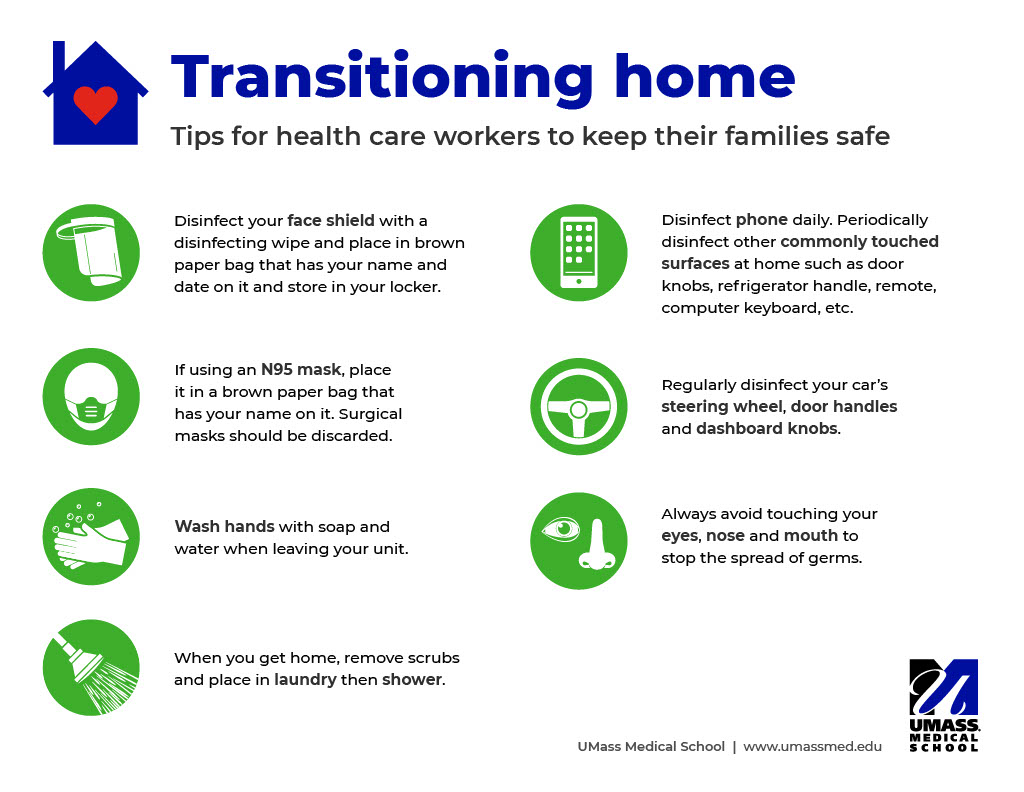UMass Medical Graduate School of Nursing develops guide to help care for caregivers going home
Kelly Sudnick led development of best practices for individuals caring for patients with COVID-19.

Click guide to enlarge or download,
A doctoral student in the Graduate School of Nursing has developed a list of best practices for health care providers and support staff to safely transition home after caring for patients who might be infected with the novel coronavirus.
Kelly Sudnick, RN, MSN, a registered nurse with the U.S. Navy, pulled together a set of steps health care personnel could follow, after she and her colleagues couldn’t find any established guidelines.
Sudnick, who served for a year in Afghanistan, understood how not having information to protect themselves and their family from COVID-19 made front-line providers feel powerless.
“Every single person has the same fear: I don’t want to bring it home,” said Sudnick.
“There’s nothing out there that covers in depth how people can protect themselves when they go home,” said Janet Hale, PhD, RN, FNP, professor of nursing and associate dean of interprofessional and community partnerships for the GSN. “The SARS-CoV-2 virus is very different from other viruses.”
The need for the guide arose from work the GSN is doing with Commonwealth Medicine and Massachusetts Department of Public Health to educate nursing home staff at Soldiers’ Home in Holyoke about COVID-19, after the commonwealth asked UMMS to help following a reported outbreak.
Nursing home populations, which include older adults living in close quarters, often with underlying chronic medical conditions, are at the highest risk of being seriously affected by COVID-19, according to the U.S. Centers for Disease Control and Prevention.
Dr. Hale and her team of faculty have been training nursing home staff so that they’re equipped to safely protect themselves as they care for large numbers of sick residents.
GSN staff are conducting new employee orientations and providing education as employees pass through the screening tent on their way into work at Soldiers’ Home, said Hale.
Sudnick volunteered to work with the GSN team because she is passionate about caring for veterans and about finding and sharing resources to combat the spread of COVID-19, she said.
Donna J. Perry, PhD, RN, associate professor of nursing, worked with Sudnick as she developed a detailed list.
The best-practices list is intended to allay caregivers’ fears by giving them actionable steps to reduce the risk of spreading infection, Dr. Perry said. The guidelines were informed by scientific findings about COVID-19 spread through surface contamination.
The guide works as well for other clinical and support staff.
Sudnick called on her wide network of nursing colleagues, first responders, Navy nurses and social media followers to come up with a comprehensive “how to” guide for infection control.
Sudnick, who also coordinated distribution of homemade masks to caregivers in her community, said, “When you look at that public health component, you’re not just taking care of people in the hospital, you’re taking care of the public.”
A condensed version of the transition protocol is being distributed to nursing home staff.
Another PhD student, Heather Briere, MS, FNP-BC, CCM, developed a smartphone app that consolidates up-to-date information from the CDC, Massachusetts DPH and in-house videos of infection control techniques for health care providers.
Briere said she created the app because, “Even as a primary health-care provider, I don’t have a place for one-stop shopping.”
The app is in alpha testing phase and Briere said she is working with Google to make it available to others.